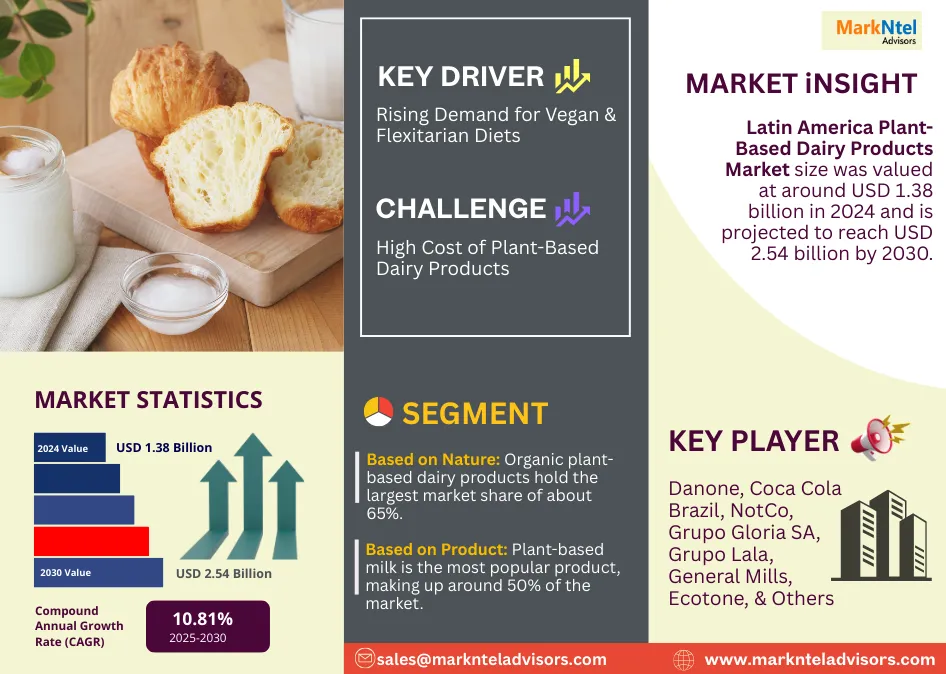Press Release Description
Latin America Plant-Based Dairy Products Market to Reach USD 2.54 Billion by 2030
The Latin America Plant-Based Dairy Products Market size was valued at around USD 1.38 billion in 2024 and is projected to reach USD 2.54 billion by 2030. Along with this, the market is estimated to grow at a CAGR of around 10.81% during the forecast period, i.e., 2025-30, cites MarkNtel Advisors in the recent research report. This market is growing mainly as a result of changing consumer preferences and recent health trends that have increased environmental consciousness. The trio included Brazil, Mexico, and Argentina, leading the way in the introduction of plant-based products, including dairy alternatives, like almond milk, soy milk, and oat milk. As per the Brazilian Institute of Geography and Statistics (IBGE), more Brazilians are switching to plant-based foods, i.e., with more than 14.0% of the population reducing meat consumption substantially in 2024.
This trend is also paralleled by the increasing demand for plant-based dairy products, with many people avoiding dairy products for lactose intolerance. In Mexico, the National Institute of Statistics and Geography (INEGI) states that the consumption of plant-based products is increasing because of rising living standards, with more Mexicans going in for a healthier diet, and the plant-based milk is rapidly gaining currency in big cities. Around 70% of Latin Americans are lactose intolerant and prefer plant-based products over traditional dairy products.
Nowadays, consumers’ concern over environmental damage is also driving the plant-based dairy market in Latin America. Most plant-based products are more environmentally friendly than dairy farming, which wholly utilizes resources such as water and land. In Latin America, where water is fast becoming a scarce resource, this makes the environmental benefits of soy products particularly attractive. For instance, making a liter of cow milk requires 1,000 liters of water, whereas the plant-based alternative, i.e., oat milk, requires only around 48 liters.

Moreover, milk production in Latin America is one of the biggest drivers of land loss and deforestation in countries such as Brazil. Data from the Brazilian agricultural research company EMBRAPA shows that most deforestation in the Amazon is caused by livestock production. Plant-based milk alternatives, on the other hand, require much less land and have a significantly less negative environmental impact. Growing consumer awareness of sustainability is driving more residents of the region to choose these products. This can be evidenced by the growing demand for plant-based dairy products such as soy cheese in countries such as Brazil and Mexico, further states the research report, Latin America Plant-Based Dairy Products Market Analysis, 2025.”
Latin America Plant-Based Dairy Products Market Segmentation Analysis
Organic Plant-Based Dairy Products Generate Maximum Market Revenue
Based on nature, the market is further bifurcated into organic and conventional. Out of them, organic plant-based dairy products have the largest market share of around 65%. The main reason behind this growth is the demand for healthier and more environmentally friendly products. According to the Brazilian Institute of Geography and Statistics, or IBGE, organic food sales in Brazil increased by 8% in 2023, accounting for USD 3.1 billion. Consumers view organic plant-based dairy products as chemical-free and are increasingly seeking cleaner and greener food items. More consumers in Latin America can afford organic products, some of which cost them 15%-20% more than inorganic products. Latin America remains committed to sustainability at the heart of its agenda, and there is increased uptake of plant-based and organic dairy products.
Mexico Leads the Latin American Plant-Based Dairy Products Industry
Mexico controls the Latin America Plant-Based Dairy Product Market with a market share of around 32%. Mexico is one of the largest plant-based dairy production manufacturers in Latin America. Production is increasing rapidly as people are becoming more health and sustainability-focused. Plant-based alternatives would largely consist of oat, soy, or almond milk, which would mean the disposable income of Mexico’s burgeoning middle class could further encourage a passion for dietary reform. With the support of government initiatives to encourage sustainable agriculture and plant-based businesses, the shift in production has taken a firm root. Brazil's plant-based milk business remains bolstered by home-grown innovation.
Competitive Landscape
With strategic initiatives, such as mergers, collaborations, and acquisitions, the leading market companies, including Danone, Coca Cola Brazil, NotCo, Grupo Gloria SA, Grupo Industrial Cuadritos Biotek, Mastellone Hermanos S.A., Grupo Lala, General Mills, Flora Food Group, Ecotone, and Others are looking forward to strengthening their market positions.
Key Questions Answered in the Research Report
- What are the industry’s overall statistics or estimates (Overview, Size- By Value, Forecast Numbers, Segmentation, Shares)?
- What are the trends influencing the current scenario of the market?
- What key factors would propel and impede the industry across the region?
- How has the industry been evolving in terms of geography and product adoption?
- How has the competition been shaping up across various countries?
- How have buying behavior, customer inclination, and expectations from product manufacturers been evolving during 2020-30?
- Who are the key competitors, and what strategic partnerships or ventures are they coming up with to stay afloat during the projected time frame?
We offer flexible licensing options to cater to varying organizational needs. Choose the pricing pack that best suits your requirements:
Buy NowNeed Assistance?
WRITE AN EMAIL
sales@marknteladvisors.comCustomization Offered
100% Safe & Secure
Strongest encryption on the website to make your purchase safe and secure
